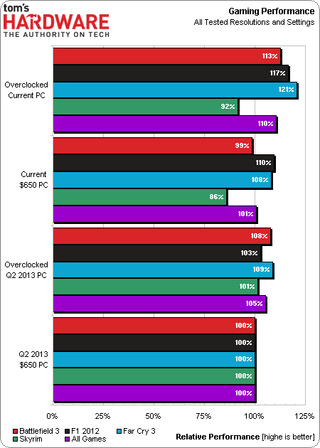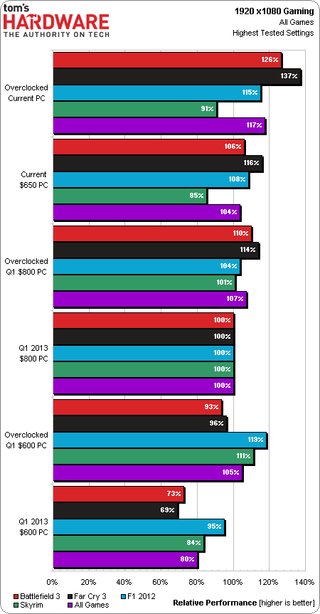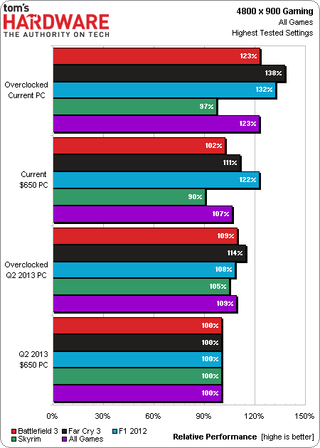System Builder Marathon, Q3 2013: $650 Gaming PC
Gaming Performance Summary

Let's recap how each of our inexpensive gaming systems performed in our gaming tests, specifically. Tallying average frame rates in every resolution emphasizes CPU performance, and this quarter's $650 PC is roughly on par with last’s quarter’s mini-ITX box. Once we factor overclocking into the equation, though, our latest effort triumphs.

But at the end of the day, you don't build either rig to play games at 1280x720 using low-end details and jagged edges. It makes far more sense to isolate the settings that enthusiasts are more interesting in actually using.
Maximizing eye candy at 1920x1080 obviously shifts the workload over to the graphics hardware. Not surprisingly, the six configurations fall in line based on their graphics prowess. Huge numbers in our two most CPU-limited games, Skyrim and F1 2012, propel the first quarter’s overclocked Core i5-based system up a couple of notches above both stock $650 PCs, but the victory isn't particularly meaningful. At 1920x1080, siphoning off more money for a faster CPU meant we were stuck with a less-capable GPU, necessitating lower quality settings for playable performance in Far Cry 3. On the other hand, both overclocked $650 machines delivered solid performance through all four games. And only this quarter’s effort packs enough graphics muscle to survive right out of the box, without overclocking.

How about gaming across three panels? Apart from CPU limitations in Skyrim, the current rig outperforms last quarter’s efforts with higher accumulated average frame rates. The main difference, as far as playable settings go, comes down to one game. At 4800x900, this quarter’s overclocked setup handled Battlefield 3’s Ultra preset with 4x MSAA similarly to last quarter's machine using 2x MSAA.

Before moving on, I'll address the hot debate over which of these affordable processors is best for gaming. While we don't want to draw sweeping conclusions based on just four games, we also know that the two chips will trade blows depending on the title's optimizations for threading. Rarely should either of them fall completely short in any specific game. The FX-6300 would be more limiting in Star Craft II, but then deliver better performance in Crysis 3.
Which way do your games lean? Which platform do you prefer? Do you overclock? What do you value more, efficiency or better all-around productivity? No choice is wrong, and we could make a case for either processor being the better one. For our SBM, where a "Gaming PC" is forced to compete for overall platform value, the affordable FX-6300 is close to perfect.
Current page: Gaming Performance Summary
Prev Page Power Consumption And Temperatures Next Page Bring On The Competition! Is This The Ultimate SBM Gaming PC?Stay on the Cutting Edge
Join the experts who read Tom's Hardware for the inside track on enthusiast PC tech news — and have for over 25 years. We'll send breaking news and in-depth reviews of CPUs, GPUs, AI, maker hardware and more straight to your inbox.
Most Popular


